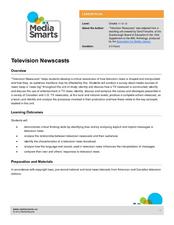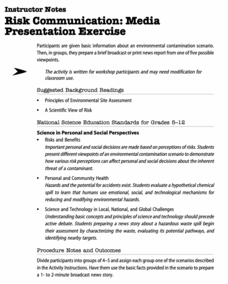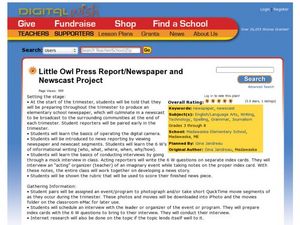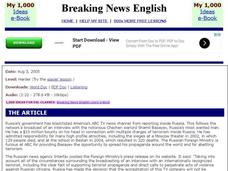Curated OER
Television Newscasts
When we watch news broadcasts on television, we receive a much more visual perspective than when we read the newspaper. How do sets, clothing, and music contribute to our understanding of the story? Compare American and Canadian news...
Rockefeller Archive Center
Understanding Mass Media News
In an age of fake news and photoshopped images, it is vital that 21st century learners development the skills they need to evaluate mass media and assess its validity. A great way to launch such a study is with a carefully crafted lesson...
Curated OER
Edward R. Murrow: This Reporter
What would Edward R. Murrow think of today’s news broadcasts? Learners examine the work of the first public television newscaster and his commitment to researched, accurate reporting. The eight-day study concludes with investigators...
Curated OER
Radio News
Part of a larger unit from the Media Awareness Network on media literacy, this particular lesson plan focuses on the medium of news radio. Small groups participate in discussions on their radio listening habits as well as the...
Facing History and Ourselves
Social Media and Ferguson
How can social media help or hinder civil dialogue? How can information shared on social media be verified? As the investigation of media reports of the events surrounding the shooting of Michael Brown continues, class members read news...
Curated OER
Risk Communication: Media Presentation Exercise
Young scholars work in groups to prepare a brief broadcast or print news report from one of five possible viewpoints about an environmental contamination scenario. Students are given basic information about a chemical spill in a small...
Newseum
'The Press and the Civil Rights Movement' Video Lesson
Scholars watch a video featuring journalists who covered the civil rights movement, then respond to questions on a viewing guide. The video features interviews with participants and original news footage from the 1950s and 1960s. In...
News Literacy Project
News Goggles: Quotes in News Reports
To quote or paraphrase? That is the question examined by a 29-slide presentation on the importance of including direct quotes in news reporting.
News Literacy Project
News Goggles: Lionel Ramos, Oklahoma Watch
Given all the recent criticism of the news media and coverage, it's crucial that young people are given the tools they need to evaluate what they see, hear, and read about current events. A video interview from "News Goggles" introduces...
Crabtree Publishing
Why Does Media Literacy Matter?
Criticism of news and entertainment journalism is at an all-time high. Help 21st-century learners develop the media literacy skills they need to become critical consumers with a three-lesson guide the looks at persuasive techniques used...
Teach Engineering
News Flash!
Extra, extra, read all about it! Scholars research information on endangered species and produce a news report to share their findings with the rest of the class. In groups, they then consider engineering solutions to problems on habitat...
Curated OER
News Coverage
Students compare and contrast methods of media coverage. In this media awareness lesson, students keep track of news regarding a world or national issue for the period of 1 week. Students collaborate to describe the type of coverage...
Social Media Toolbox
Social Media Usage
Is there a difference in the way organizations present news via social media and in print? The third in a series of 16 lessons from The Social Media Toolbox explores news outlets and their delivery methods. Groups follow a story for a...
Social Media Toolbox
Reporting with Social Media
What does it take to create news stories that are both informative and objective? Aspiring journalists walk the line between engagement and activism with lesson 15 of a 16-part series titled The Social Media Toolbox. Grouped pupils...
Curated OER
Macbeth News Broadcast
Here is an authentic assessment task for Shakespeare's Macbeth. Young literature scholars prepare, perform, and record a news broadcast about the major events in the play. For example, groups may choose to report on the death of Lady...
Newseum
News About My Community
After researching statistics about their community in local census reports, young journalists interview a resident about their interests and then analyze a local newspaper or homepage to see how similar the stories are to the residents'...
Facing History and Ourselves
Verifying Breaking News
The attempts of journalists to verify the events surrounding the shooting of Michael Brown take center stage as individuals analyze three of the initial newspaper accounts of the story. The whole class discussion then focuses on the...
Curated OER
Little Owl Press Report/Newspaper and Newscast Project
Discover journalistic techniques by having learners prepare and write their own class newspaper. They discuss the five W's of investigative journalism and conduct interviews with school figures. They utilize video technology, podcast...
PBS
Decoding Media Bias
Alternative facts? After watching the We The Voters film, "MediOcracy," viewers compare how cable news outlets CNN, Fox News, and MSNBC report the same story about politics or public policy. After a whole-class discussion of their...
Curated OER
Producing a Daily News Broadcast: A Cross-Curricular Activity
Sixth graders create the daily news for their school.
Curated OER
Breaking News English: TV News about Russia
In this TV News about Russia learning exercise, students read the article, answer true and false questions, complete synonym matching, complete phrase matching, complete a gap fill, answer short answer questions, answer discussion...
News Literacy Project
News Goggles: Conflicts of Interest in News Reports
Nineteen slides use the story of Chris Cuomo of CNN and his refusal to discuss his brother, New York governor Andrew's political troubles, to inform viewers about the idea of conflict of interest in journalism.
Newseum
Media Ethics: Fairness Formula Starts With Accuracy
As part of a study of media ethics, young journalists apply a fairness formula to news reports. They look at accuracy, balance, completeness, detachment, and ethics to determine if the reporting is fair.
Facing History and Ourselves
#IfTheyGunnedMeDown
As part of their continued investigation of the reporting of the shooting of Michael Brown class members analyze photos of Michael Brown and the social media response to these images. The class then develops a guide they believe news...

























